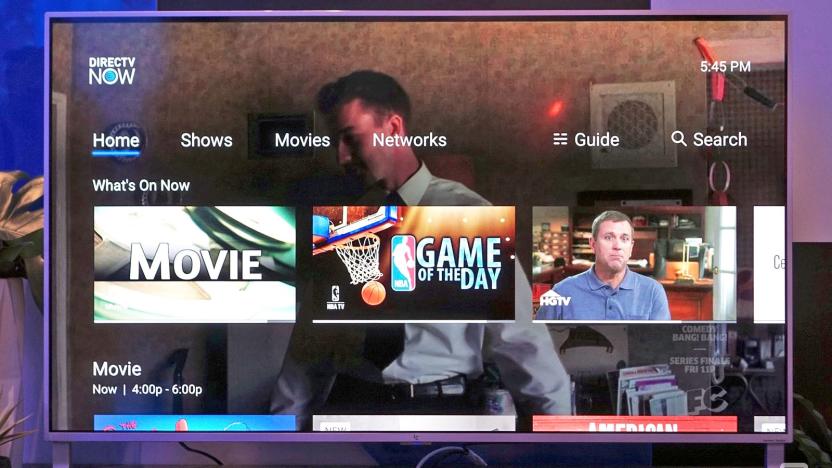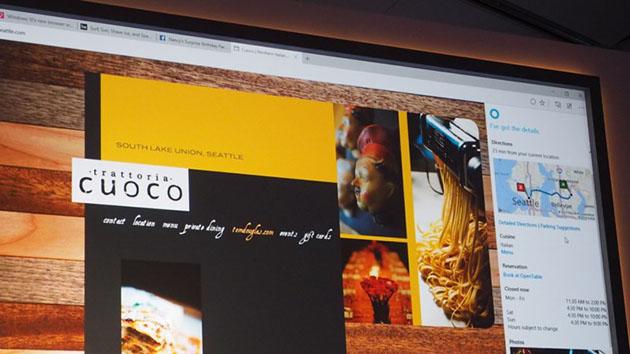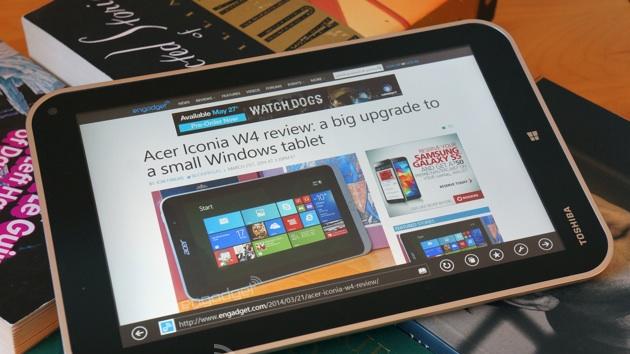internetexplorer
Latest

Microsoft patches Internet Explorer flaw being used to hijack PCs
Microsoft has rolled out a fix for a zero-day Internet Explorer vulnerability that hackers are already using for targeted attacks. The tech giant didn't elaborate on the scope of those attacks, but it did explain how criminals can use the memory-corruption flaw. Apparently, attackers simply have to get users to visit websites engineered to exploit it -- by sending them links via email, for instance -- in order to hijack their computers. Once attackers gain control of their system, they can install programs, view or even change data, as well as create new accounts with full user rights.

Microsoft rumor points to a Chromium replacement for Edge
Three years after arriving along with Windows 10, Microsoft's Edge browser has added features and showed some good statistical results, but it hasn't pulled many users away from the competition. Now, Windows Central reports that Microsoft could start over with a new browser built on Chromium, the open source base behind Google Chrome and other browsers like Brave, Amazon Silk and Opera. The rumored codename for the project is Anaheim, and this news pops up after a recent post by 9to5Google pointing out a number of code commits to the Chromium project by Microsoft developers. At the time, the news centered around the possibility of a Windows 10 on ARM-compatible version of Chrome, but this would represent an even larger step. So why would they make this move, perhaps as early as the first half of next year? Windows Central speculates that it could keep rendering consistent with Chrome while using the default browser to keep web developers happy, Microsoft watcher "Walking Cat" notes Edge supports multiple rendering engines already, and Swift on Security points to the popularity of ElectronJS in apps requiring native optimizations to improve performance.

DirecTV Now will only stream in Chrome on the web
Heads up, DirecTV subscribers: AT&T's streaming TV service will drop support for Apple and Microsoft's baked-in browsers starting at the end of the month. According to Apple Insider, AT&T has already started directing cord-cutting Mac customers to tune in using Google Chrome. The same goes for anyone still streaming DirecTV on a PC using Internet Explorer.

Windows metadata bug has been waiting to cripple older machines (updated)
If you're still using Windows 7 or Windows 8, there's another security issue you need to be aware of aside from Wannacry. This one won't hold your computer ransom for bitcoin, though. Actually, it might be more annoying than it is dangerous. Researchers from Aladdin RD, an information security company, recently discovered (translated) that a bad image call embedded into a website can bring older computers to a grinding halt. In this case, it's filename "$mft."

Critical security flaws found in LastPass on Chrome, Firefox (updated)
Last year Google Project Zero researcher Tavis Ormandy quickly found some "obvious" security problems in the popular password manager LastPass, and now he's done it again. Last week Ormandy mentioned finding an exploit in one version of its extension for Firefox, before following that up with a new bug that affected both Chrome and Firefox, and finally a third vulnerability that could allow "stealing passwords for any domain."

Malware infects computers by hiding in browser ad GIFs
Unless you still use Internet Explorer (and please don't do that), you probably don't have to worry about new malware discovered by Eset researchers. However, the Stegano exploit kit shows how adept hackers have become at slipping infected ads past major networks and then hiding the malware from discovery. It's been operating stealthily for the last two years and specifically targeting corporate payment and banking services.

Chrome extension restores the backspace key to its former glory
Lots of very smart people work at Google, but that doesn't mean they're immune from making decisions that piss people off. Consider this recent Chrome kerfuffle: some users were recently shocked to discover that, upon updating Chrome, they could no longer tap the backspace key to go back a page. Mild panic, and lots of comments, ensued. If that sounds an awful lot like you, well, you can dial down the anguish a little -- Google released a Chrome extension called Go Back With Backspace that does exactly what its name implies.

Even Windows 10 is vulnerable to a big Internet Explorer security flaw
Just because Internet Explorer sits on the sidelines in Windows 10 doesn't mean you're safe from IE-specific exploits. Microsoft has released a patch for a "critical" flaw in the browser that lets attackers remotely control just about any semi-recent version of Windows, ranging from Vista to 10, just by serving you a maliciously-coded web page. The likelihood of running into an exploit is slim if you prefer to use Edge or a third-party browser, but you'll probably want to get the fix regardless... just in case you feel nostalgic enough to click on that blue E.

Microsoft patches up IE flaw that gives hackers access to your PC
Microsoft has issued a critical update to patch up an Internet Explorer hole that can give hackers access to your system. Hackers could create websites capable of exploiting the zero-day vulnerability -- discovered by Google researcher Clement Lecigne -- and get you to click on the URL via email or instant messenger. They will then get the same user rights you have, making the flaw more dangerous if you have administrative access or if you're handling a server or a workstation. With admin powers, intruders can remotely install applications and steal your data.

Microsoft's new browser won't enable 'Do Not Track' by default
Microsoft admits that when it switched on "do not track" by default in Internet Explorer 10 back in 2012, it was "welcomed by many." However, the company now has to switch it off to comply with the latest industry standard. The newest World Wide Web Consortium (W3C) draft for the feature says it "MUST reflect the user's preference," meaning you have to turn it on to activate it, just like on Firefox or Chrome. Redmond explains that it has no choice but to change the default, else advertisers can argue that it doesn't have to honor any DNT signal from Microsoft's browser.

Microsoft's new browser previewed in video
It was back in January that Microsoft showed off its long-awaited replacement for Internet Explorer, currently named "Project Spartan." The new browser is designed to be light, nimble and secure, with the company stressing how deeply Cortana, Microsoft's virtual assistant, is baked into the software. Now, thanks to WinBeta, we've gotten the first sense of how that'll work out in the real world. For instance, visit the homepage of a restaurant and the blue circle in the address bar will bounce to advise you that more information is available. In addition, you can highlight and right-click a word to define it, and typing in keywords in the address bar -- such as weather -- will bring up relevant information. The video is short, but you can expect plenty more like that when the previews of Windows 10 (with Spartan) arrive at the end of the month.

Microsoft's new browser includes Cortana and offline reading
Internet Explorer is dead; long live "Project Spartan!" Even the most die-hard Microsoft fan would probably admit that Microsoft's browser has become the punchline to a lot of jokes. The advent of Windows 10 has seen the outfit attempt to fix many of the gripes that users had with the last two generations of the operating system, so perhaps it's no surprise to see that a replacement browser is in the works. Microsoft has now revealed more information about the browser project, apart from its actual name -- for now, it's code-named Project Spartan.

Windows 10 will reportedly come with a new, lighter web browser
Internet Explorer has been a cornerstone of Windows ever since 1995, but it looks like Microsoft is ready to leave its venerable (if sometimes infamous) web browser by the wayside. ZDNet understands that a previously rumored overhaul to Internet Explorer for Windows 10, nicknamed Spartan, is actually a brand new creation. It would still use the company's own web engines, but it would be far more "light-weight" and, if you believe earlier leaks, behave more like Chrome or Firefox. The break is reportedly sharp enough that the future Windows version will keep Internet Explorer 11 around in case you need it for certain apps or features.

You'll soon be able to make Skype calls in your browser
Microsoft has just announced that you'll soon be able to make video and voice Skype calls from just about any computer with a web browser. Skype for Web (beta) calls will work on Chrome, Safari, Firefox and of course, Internet Explorer, with the addition of a "small plugin," at least for now. Microsoft said that it'll eventually work natively on browsers without plugins or downloads once WebRTC is more widely implemented. That'll be especially handy for users with no access to the dedicated app who may want to chat with or message friends from, say, an internet cafe in a foreign country.

Microsoft wants you to say farewell to ye olde Internet Explorer
Microsoft seriously wants users let go of older Internet Explorers and move on -- so much so that the company has even set a deadline. Starting on January 12th, 2016, Microsoft will stop issuing security updates and providing tech support for any IE browser other than the most recent one (that's IE 11, for the unaware). In a recent post on the IEBlog, Redmond listed a number of reasons why people should upgrade their browsers, including improved security, as IE 11 is more equipped to protect users from vulnerabilities compared to older versions. The company also explained that its latest browser is faster than its predecessors, and that website and app developers will be able to work more efficiently if everyone stops using ancient browsers that don't support modern web standards.

Internet Explorer will block old plugins that leave your PC open to attack
Internet Explorer is generally safe for your web browsing needs these days, but that's not necessarily true of the plugins it runs; one old piece of code could leave your PC open to attack. To that end, Microsoft has announced that Internet Explorer 8 through 11 will start blocking outdated ActiveX controls (Internet Explorer-specific add-ons) when an update arrives on August 12th. Much like what you see in Chrome, you'll get a warning if a website wants to use an older plugin. While you can force the obsolete software to run, it won't load automatically until you either upgrade or disable the warnings altogether. IE's blocking will initially focus on ancient versions of Java, the most frequent target of web-based exploits, but it should expand to other plugins over time.

Some new Windows Phones won't let you change your web search provider
If you're picking up a shiny new Lumia 630 or 930 in the near future, you may be in for an unwelcome surprise. The Verge has discovered that at least some unlocked versions of either Windows Phone won't let you switch Internet Explorer's default search provider to Google; it's either Bing or nothing. Some European models of the same phones do let you change the provider, though, so this clearly isn't a platform-wide policy. We've asked Microsoft if it can share more about what's going on, and we'll let you know if it has more to add. The move likely won't cause that much consternation given that many Windows Phone users are inclined to use Bing, but it's bad news if you like to use Google services on Microsoft platforms.

Internet Explorer test release lets you peek at the browser's long-term future
While Chrome and Firefox have had experimental browser releases for a while, you've usually had to wait for betas to try new Internet Explorer features. Starting today, however, you can be as impatient as you like: Microsoft has launched an Internet Explorer Developer Channel. So long as you're using Windows 7 or 8.1, you can try new web rendering, interfaces and other features well before they're part of finished products. In this first release, you can use any USB game controller (including the Xbox 360 pad) for web games that would benefit from console-quality input.

New Windows 8.1 version is cheaper for device makers, with a catch
Microsoft has just announced Windows 8.1 with Bing, confirming rumors about a lower-cost Windows version for OEM manufacturers only. As suspected, Redmond is attempting to recoup the lost revenue with ads by forcing suppliers to keep Internet Explorer with Bing search as the default browser. However, end-users will be able to change those settings so that Microsoft won't arouse the wrath of European regulators (again). Rumblings about a discounted version of Windows 8.1 began cropping up earlier in the year, and Microsoft recently announced that Windows Phone 8.1 would be free for 9-inch or smaller devices. Other than the Bing and IE defaults, the new OS is reportedly identical to the standard version of Windows 8.1. However, the OEM cost will reportedly drop from $50 to $15, so don't be surprised to see a new crop of cheaper Windows devices arriving soon.

Serious Internet Explorer flaw puts XP users especially at risk
We hope that you heeded our advice to finally ditch Windows XP in favor of a more modern operating system, because there's a new security exploit that'll leave stubborn XP users in the cold. In a security alert released on Saturday, Microsoft reports that there's a serious vulnerability in Internet Explorer 6 through 11 that could allow hackers to take over your computer remotely if you happen to visit a malicious website. According to security firm FireEye, it has already found evidence of an attack that targets IE 9 through 11 that uses a well-known Flash exploitation technique to gain access to your computer's memory. Microsoft has already said it plans to roll out an IE security update for all modern versions of Windows, but if you're using XP, well, you're out of luck, as support for that 12-year-old OS ended a few weeks ago.







